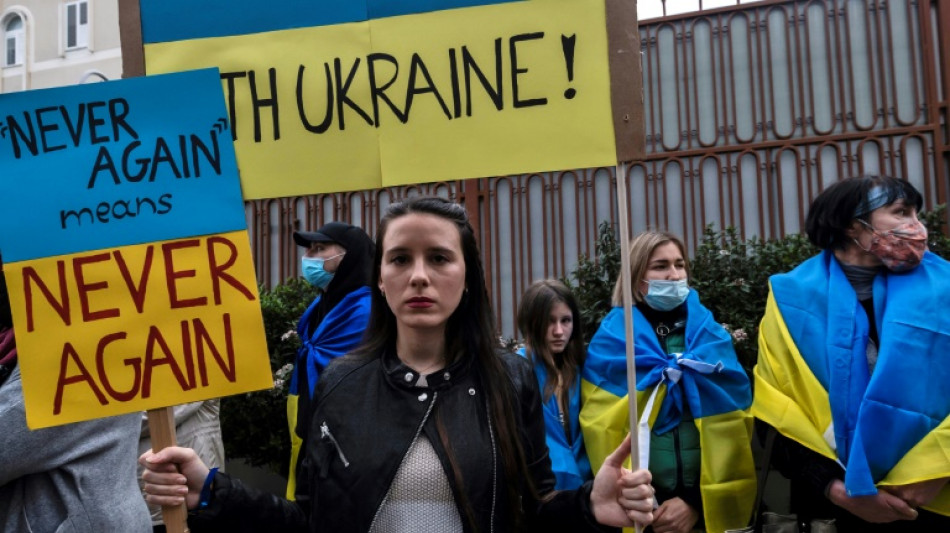
Cyprus fears financial fallout of Russia's Ukraine invasion

The golden beaches of Cyprus may seem a long way from Russia's invasion of Ukraine, but many on the eastern Mediterranean holiday island fear damaging financial fallout from unprecedented sanctions on Moscow.
Nicosia and Moscow have close political and cultural ties, but a day after Russia sent troops into Ukraine, the Cypriot parliament unanimously passed a resolution condemning the invasion, while President Nicos Anastasiades said the island stood "together with all Europeans".
Cypriots and Ukrainians on Tuesday marched outside the Russian embassy in protest with placards decrying "Russian aggression".
Cyprus, the European Union's most easterly member, backed the bloc's actions on Russia, including a flight ban and sanctions barring some Russian banks from the SWIFT financial system.
While Finance Minister Constantinos Petrides on Wednesday insisted Cyprus "will be affected much less than other countries", it has sparked worries among tour operators and financial experts.
Russian tourists make up the second-biggest number after British visitors, some 18,000 Russians are registered as resident on the island -- one of largest non-EU groups -- while there are also significant Cypriot-Russian investments.
The key tourism sector, which had contributed 2.68 billion euros ($2.97 billion) in 2019, some 15 percent of GDP, is still reeling from two disastrous years of Covid travel chaos.
Cyprus has counted on tourists from Russia and Ukraine for a revival. In 2019, before the start of the Covid-19 pandemic, a fifth of tourists were Russian -- 782,000 out of 3.9 million.
Last year, despite tough Covid travel restrictions, that share rose to nearly a third, with arrivals from Russia and Ukraine totalling some 600,000 out of 1.93 million.
Operators had hoped this summer would see a bounce back of the business.
- 'Huge blow' -
Russia's ambassador in Nicosia, Stanislav Osadchiy, argued Cyprus had "shot itself in the foot" by backing EU sanctions.
"Where will Cyprus get its Russian tourists from?" he said in an interview with Cypriot Sigma TV.
"They won't come; where will they go? To Turkey, is that what you want? Summer is coming. You've closed your airspace."
Turkey is not only a rival holiday destination; its troops have occupied the island's northern third since a 1974 invasion in response to a Greek-engineered coup.
Foreign Minister Ioannis Kasoulides said Cyprus had the right to rethink its Russian flight ban if Turkey did not do the same.
In the popular beach resorts of Ayia Napa and Protaras, where Russians and Ukrainians account for around half of holidaymakers, many are worried.
Doros Takkas, head of the Famagusta hotels association, said it was a "huge blow" to the sector.
"Many of the hotels in the region work exclusively with these specific markets," Takkas told reporters. "That means about 30 percent of hotels may not be able to open at all."
But while Tourism Minister Savvas Perdios warned of a "considerable loss", he said the government would try to attract tourists from elsewhere.
"This season will be hard, but it will not be grim," Perdios told state news agency CNA, suggesting visitor shortfalls could be made up by encouraging extra flights from Austria, France, Germany, Hungary, Israel, Italy and Poland.
"These markets will conduct between 20 and 40 flights per week, compared to 100-120 from Russia and Ukraine", he said.
- Russian investments -
Petrides, the finance minister, has sought to downplay the consequences at least in terms of the banking system, saying Cyprus had no reserves held by the Russian Central Bank.
"The sanctions concerning the EU banking system do not affect Cyprus to a large extent, as Cyprus's banking system has no exposure to Russia," Petrides said, quoted by CNA.
Cyprus has earned a reputation -– strongly rejected by the authorities -– of being a haven for dirty Russian money.
Critics said it was important that Nicosia backed the SWIFT ban, because Cyprus is allegedly home to several offshore companies of Russian oligarchs.
Nicosia gave hundreds of passports and residency to rich Russians under a citizenship scheme, scrapped in November 2021 after accusations that criminals used it to launder money.
However, according to Cypriot media, banking institutions scrutinising sanctions lists say they have not found any large-scale portfolio investments of concern.
Petrides has insisted the Cypriot banking system "maintains one of the highest levels of capital adequacy and liquidity, and there is no reason for concern for any bank in Cyprus."
Meanwhile, Cyprus has offered support to Ukraine.
Defence Minister Charalambos Petrides has said it is willing to provide humanitarian aid to Ukraine, and backed the EU decision to fund the purchase of military equipment.
Cyprus also hosts British military bases, with the Royal Air Force sending extra Typhoon fighter jets to fly "air policing missions", including "patrolling NATO airspace over Romania and Poland", the British defence ministry said.
L.Guglielmino--PV
